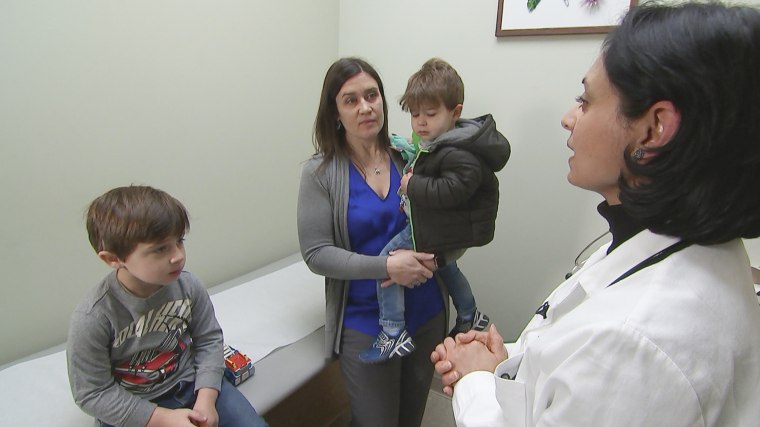All of a sudden it begins. The body aches, fever, headache, sore throat and coughing. Influenza has invaded your home.
It’s no surprise. The flu season is starting to kick in; it's now widespread in 30 states and more than 6 million people have already caught it, the Centers for Disease Control and Prevention said Friday. The CDC counts the death of every child from influenza and, so far this year, 16 children have died from flu. Adult sicknesses and deaths are estimated.
The CDC estimates that 69,300 to 83,500 people have been hospitalized because of it and 2.9 to 3.5 million people visited their doctor for treatment for it. Most of the flu infections are the H1N1 flu type but the CDC saw an increase of H3N2 cases in the southeastern part of the United States.
As the flu season continues, frantic parents obsessively wash hands and monitor every head for fever. They'd do anything to keep the flu away. While worry is normal, pediatrician Dr. Shilpa Patel of Rockleigh, New Jersey, shared what she wants parents to know and how to protect their children from flu.
1. The vaccine works (and doesn’t cause flu).
The flu vaccine, which is attenuated, prevents children from two strains of flu A and one or two strains of flu B, depending on the vaccine. It is the easiest way to protect against the flu.
“I really wish parents would vaccinate,” Patel told NBC News.
Her young patients that have been vaccinated this year have milder cases and are "bouncing back in a couple of days" compared to unvaccinated children.

"The patients that received the vaccine; they're smiling, they're bouncing around," Patel said. "The patients that didn't get it, they kind of look like death warmed over. They just don't look good."
Some people think that getting the vaccine causes the flu but it doesn’t.
“You really can’t,” she said. “The flu vaccine is a dead vaccine and you can’t get the flu from it.”
2. Some never get a fever.
Parents may not always realize children have the flu because they don't have a fever. Common symptoms for children are watery eyes, a runny nose and sneezing.
“You don’t have to have a fever with the flu,” said Patel.
If, on the other hand, the child had a fever which has come down, but your child is still lethargic and not moving, he or she needs to be seen by a doctor immediately.
3. It’s not too late to get a vaccine.
Flu season lasts for months. Right now, most people are experiencing flu A of the N1H1 strain. But Patel suspects that in the spring there will be another surge and this time people will get flu B, which tends to be more severe. Getting vaccinated mid-flu season can protect you from becoming sick later in the season.
“It’s never too late,” she said. “Sometimes you see flu until May.”
4. People with the vaccine can still get the flu but don’t skip it.
Patel has treated several children who have the flu even though they were vaccinated. While this might make some think that skipping the vaccine is OK, Patel said it is not. Children who have the flu and are vaccinated are healthy and active, while children with the flu who haven’t received the vaccine can barely move.
“What you get is way less severe,” she explained. “Kids with the vaccine, they are bouncing around. Kids without the vaccine don’t look good. They have pneumonia and all the complications.”
If a child complains of persistent body aches with severe cough, headache and sore throat, she urges parents to take their children to the doctor.
5. Stay hydrated.
Many sick children might not want to do anything but sleep. But it’s important for parents to keep their children hydrated. Patel recommends a mix of half Pedialyte and half sports drink, the former for the electrolytes and the latter for the sugar.
“If they don’t eat but they are taking fluids it is OK. Push the fluids,” she said. “The things you have to look for is if the child is not urinating or the child is not moving. Something like that see your pediatrician right away.”
6. There is a treatment for the flu.
Several antiviral medications treat the flu. They lessen the duration of the illness and some of the severity of the symptoms. While some people might welcome the relief, Patel said it is not absolutely necessary for people to take antivirals to treat the flu.
“The very young and the very old should probably have it, or if you have an underlying issue,” she said. “If you are healthy and over the age of 5 and have no issues I don’t necessarily think you have to do it.”
7. Stay home to get better.
Most schools require children to stay home for 24 hours after a fever breaks.
“You have to be 24 hours fever-free before you allowed to go back to the school because you are technically contagious,” she said.
What’s more, she supports keeping children (and adults) at home so they can get better. Rest makes recovering from the flu easier and prevents people from spreading the flu to others.